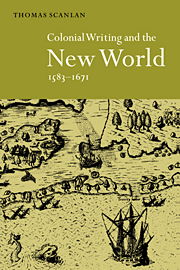Book contents
- Frontmatter
- Contents
- List of illustrations
- Acknowledgments
- Introduction
- 1 The allegorical structure of colonial desire
- 2 Fear and love: two versions of Protestant ambivalence
- 3 Forgoing the nation: the Irish problem
- 4 Preaching the nation: the sermon as promotion
- 5 Love and shame: Roger Williams and A Key into the Language of America
- 6 Fear and self-loathing: John Eliot's Indian Dialogues
- Coda
- Notes
- Index
5 - Love and shame: Roger Williams and A Key into the Language of America
Published online by Cambridge University Press: 04 December 2009
- Frontmatter
- Contents
- List of illustrations
- Acknowledgments
- Introduction
- 1 The allegorical structure of colonial desire
- 2 Fear and love: two versions of Protestant ambivalence
- 3 Forgoing the nation: the Irish problem
- 4 Preaching the nation: the sermon as promotion
- 5 Love and shame: Roger Williams and A Key into the Language of America
- 6 Fear and self-loathing: John Eliot's Indian Dialogues
- Coda
- Notes
- Index
Summary
I suggested in the last chapter that there was, during the early years of English colonization, a discernable tendency to construct the colonial venture as a means of projecting a vital Protestant presence into the New World and thereby challenging the perceived threat of Catholic hegemony in the region. England's colonies could, therefore, give substance to a national and religious identity that seemed ever in danger of dissolving. In this sense, the Virginia divines, as I have called them, seem to have discovered a way of overcoming the difficulty that confronted Edmund Spenser as he tried to imagine the successful colonization of Ireland in the absence of a coherent English national identity. Moreover, these divines also seem to have realized the promise implicit in Théodore DeBry's monumental work, namely that national and religious aspirations could be neatly combined under the umbrella of colonial activity. Indeed, in the preaching of these divines, colonial activity is effectively and persuasively represented as absolutely central to England's struggle to construct itself as a Protestant nation.
If one senses during the early colonial period the desire to imagine the colonies as pure expressions of an unconflicted national identity, one discovers that such a desire was not easily attainable, as England's colonial culture soon became as divided as the nation that spawned it. In this chapter, we will explore the ways in which Roger Williams's 1643 text, A Key into the Language of America, exploits those divisions in order to advance his own colony of Providence Plantations over the already established and much admired Massachusetts Bay Colony.
- Type
- Chapter
- Information
- Colonial Writing and the New World, 1583–1671Allegories of Desire, pp. 123 - 154Publisher: Cambridge University PressPrint publication year: 1999



